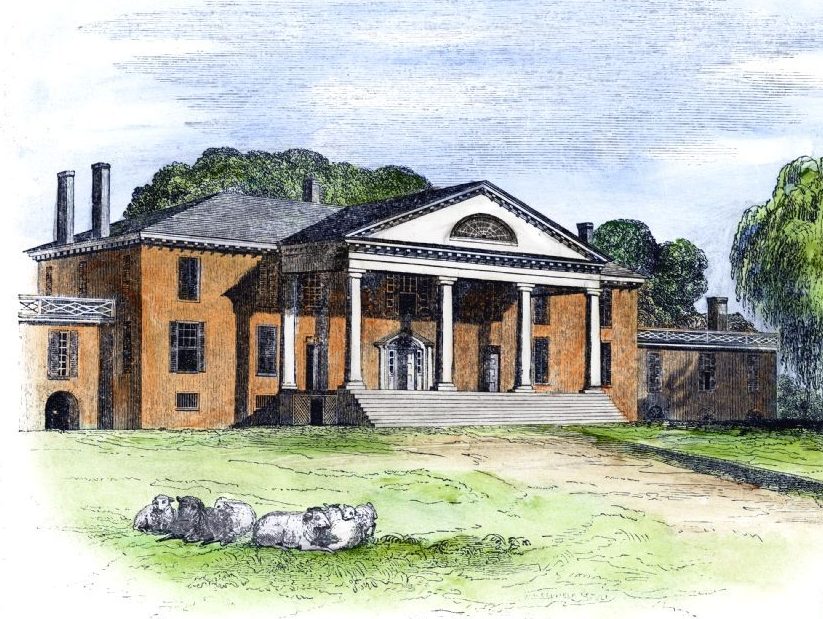Was James Madison a politician or a political theorist? Of course he was both – I don’t think that will be disputed. The trickier question is to what degree these two roles harmonized or conflicted with one another.
For instance, did Madison reinvent his political principles to advance his own political career? Alexander Hamilton thought so after Madison joined Thomas Jefferson in opposing the National Bank, and many historians and biographers have repeated the charge. How, Hamilton wondered in a 1792 letter to Edward Carrington, could this be the same Madison “whose policies had formerly so much the same point of departure” as his own?
Indeed, how could the Madison who at the Federal Convention of 1787 proposed a federal power to veto state legislation “in all cases whatsoever” become the Madison whose 1798 Virginia Resolutions denounced the Alien and Sedition Acts as unconstitutional and urged the states “to interpose for arresting the progress of the evil”? Why did Madison call a Bill of Rights unnecessary in 1787 and then sponsor it in 1789? The readiest explanation is that Madison, despite his theoretic speculations, was above all a Virginia politician responding to electoral incentives: as public opinion in Virginia shifted, so did Madison.
Certainly as a state Assemblyman in the 1780s and late 1790s, and as member of the U.S. House of Representatives (1789-1797), Madison took into account the views and interests of his Virginia constituents. His own republican theory encouraged him to do so.
Yet Madison’s responses to political incentives were guided to a significant degree by his preoccupations as a theorist. Consider the Bill of Rights story: Madison faced a tough race for Congress in early 1789, the Bill of Rights idea was popular in Virginia, so Madison promised to introduce it. Other Virginia politicians in Madison’s place might have done the same.
But Virginia electoral incentives would not have predicted the specific character of Madison’s proposed Bill of Rights (June 8, 1789), and in particular his fifth article: that “no state [emphasis added] shall violate the equal rights of conscience, or the freedom of the press, or the trial by jury in criminal cases.” (This section of Madison’s proposed Bill of Rights was not enacted.) During the ratification debate, critics of the Constitution had called for a Bill of Rights to restrict the powers of the federal government – but not for a Bill of Rights that would have obliged both states and federal government to respect fundamental liberties, and in the process perhaps enhanced the role of the federal judiciary.
That proposal arose instead from Madison’s own concern, as a theorist, for perfecting a federal system that offered “double security” (a term he used in Federalist No. 51 and again in his June 8, 1789 speech introducing a Bill of Rights) for fundamental rights. Under Madison’s “double security” federalism, either level of government (federal or state) might pose a threat to liberty; either level of government might be mobilized to defend liberty against the encroachments of the other.
This also helps us understand why Madison’s apparent reversals from nationalist (1787) to states’ rights advocate (1798) and back again (1830, when he denounced nullification) did not appear inconsistent to him. While so many of his contemporaries were preoccupied with defining and locating sovereignty, Madison was above all concerned with ensuring liberty. That was his priority, both as theorist and politician.
I am skeptical about “original intention” constitutionalism. Madison was not necessarily a representative framer. And his theorizing led him to make some mistakes; he later acknowledged that his proposed universal veto on state legislation was “finally and justly abandoned” at the Federal Convention. Finally, there is much about our contemporary world that neither Madison nor any other framer could have foreseen.
But that threats to liberty can proceed from any branch or level of government, and that we might need to enlist any branch or level of government to counteract such threats – here I become more convinced of Madison’s wisdom with every passing day.
JIM READ

Alexander Hamilton’s charge that James Madison unaccountably (or disreputably) abandoned Hamilton’s consistent position concerning the power of the central government omits the explanation Madison himself gave. The difference between the two on this score is the difference between Sir William Blackstone’s theory of sovereignty, on one hand, and Article VII of the Constitution, on the other.
Yes, James Madison joined with Robert Morris, Gouverneur Morris, Hamilton, and other congressmen in the 1780s in working for a national bank, a national tariff, and other national measures. Since the states retained active supervisory power over the Confederation Congress at that time, for him to do so was not inconsistent with the new American idea of popular (state—as Madison later defined “state” in the Virginia Report of 1800) sovereignty.
The same understanding of sovereignty—that it was lodged in the American system in the people of each state—led Madison to claim repeatedly, from 1787 to his death nearly a half-century later, that the authoritative reading of the Constitution was to be found in the ratification conventions. Those conventions, uniquely in the federal system, were the sovereign peoples of the states.
Madison had gone to Philadelphia in summer 1787 intent on having the Federal Convention draft and propose to the states a national constitution. In his “Vices of the Political System of the United States,” Madison had described several types of imperfection of the Articles of Confederation, and his answer to each of them was some kind of augmentation of the central government’s power.
Thus, he would have apportioned Congress entirely by population, altogether deprived state legislatures of their role as electors of congressmen, given Congress a veto over all state laws, and allowed Congress to legislate regarding any nationally significant question, besides creating national courts with similarly broad jurisdiction. Although he got his way concerning several less significant provisions, his defeat in regard to all of these left him complaining to his friend Thomas Jefferson that though better than the Articles, the proposed Constitution would fail within a few years.
Madison realized, however, that even this pallid adaptation of his proposal would be hard to sell to the ratification conventions, and so he argued that it was and would remain a federal (not national) constitution. It would have only the enumerated powers, he insisted as Publius. More importantly, his two chief allies in the Virginia Ratification Convention repeatedly held that Congress would have only the powers “expressly” (Governor/Framer Edmund Randolph’s word) granted, and that—as George Nicholas put it—in case Virginians believed the Federal Government was abusing the powers it had been granted, they could reclaim them. Again: Madison, Randolph, and Nicholas were the three chief Federalist spokesmen in the Richmond Convention. Virginians remembered the vows all three of them had made.
To include an amendment empowering federal courts to enforce the few dearest individual rights against state governments among the amendments he proposed in Congress was not contrary to any vow Madison had made during the ratification struggle. Assumption of State Debts was, however, and I agree with James Read (and Fisher Ames) that Madison was in a political spot and had to make clear that he stood for the Constitution as he and his allies had sold it. He had no trouble doing so, and his speeches in the House against Hamilton’s Bank Bill followed very closely upon the news that the General Assembly had adopted Patrick Henry and Henry Lee’s resolution echoing Governor Randolph’s vows that Congress would have only the powers “expressly” granted, and so Assumption was unconstitutional. The Federalists would be held to their word. (Lee, a Federalist, called Henry “prophet” at that point.)
For Hamilton, the inconsistency between what Publius had said about the limits of congressional power and his bank bill was no problem. Neither, of course, would be that between a law empowering the president to call out the militia to enforce federal law if a state governor said he needed the help and a president doing so without the governor’s requesting it during the Whiskey Rebellion, or that between the Tenth Amendment, the Speech Clause, and the Press Clause, on the one hand, and the Sedition Act, on the other. In short, Madison’s republican ethics bound him to obey the federal constitution the people had created even though he as a framer had proposed a national one, while Hamilton felt no such compunction.
KEVIN GUTZMAN

Alexander Hamilton believed that the Constitution as framed and ratified left the federal government too weak. For that reason Hamilton sought to augment the federal government’s powers by interpreting the Constitution expansively and administering the government energetically.
James Madison, in contrast, believed that how the people themselves understood the Constitution when they ratified it was the key to interpreting its meaning. Thus it was not inconsistent for Madison to argue for expansive federal powers at the 1787 Convention, then for more restricted powers in 1791 during the Bank debate. The people had decided against some of the powers for which Madison had argued at the Convention, and he deferred to their decision. I believe that Kevin Gutzman and I agree on this point.
Gutzman and I appear to differ, however, with respect to which people’s understanding – the people of the United States as a whole, or the people of Virginia specifically – Madison believed he was obliged to defer when the Constitution’s meaning was at stake. Gutzman’s position, if I understand it correctly, is that each individual state was a separate sovereign people, not only before the act of ratification but afterward as well. It would follow that it was Madison’s duty to interpret the Constitution as the people of Virginia understood it when that state ratified the document. For Madison’s vows (as Gutzman expresses it) were to Virginia.
As a U.S. House member from Virginia, Madison would certainly have had electoral incentives to pay close attention to public opinion in his home state. But in characterizing how “the People” understood the Constitution when they ratified it, he drew evidence from the ratifying conventions of many states.
For example, in his June 8, 1789 speech introducing the Bill of Rights, Madison remarked, “The people of many States have thought it necessary to raise barriers against power in all forms and departments of Government…” In his February 2, 1791 speech arguing against the constitutionality of the Bank, Madison “read sundry passages from the debates of the Pennsylvania, Virginia and North-Carolina conventions” and referred to “the explanatory declarations and amendments accompanying the ratifications of the several states.” Virginia’s ratification debate was certainly an important source of evidence. But Madison considered it essential to discern constitutional meaning through statements by the people of multiple states; he did not treat Virginia’s understanding as definitive.
Sir William Blackstone defined sovereignty as a “supreme, irresistible, absolute, uncontrolled authority.” Gutzman correctly observes that Madison (in contrast to Hamilton) denied that the federal government enjoyed Blackstonean sovereignty. But Madison likewise denied that any American state enjoyed supreme, irresistible sovereignty over its citizens once that state had ratified the U.S. Constitution. Madison was always less interested in pinpointing sovereignty than in defending rights and liberties against violation by any branch or level of government.
JIM READ

This conversation will be continued in Part II next week.
James H. Read is Professor of Political Science at the College of St. Benedict and St. John’s University in Minnesota. He is the author of Power versus Liberty: Madison, Hamilton, Wilson, and Jefferson (2000) and Majority Rule versus Consensus: The Political Thought of John C. Calhoun (2009). He is currently writing a book tentatively titled Sovereign of a Free People: Abraham Lincoln, Majority Rule, and Slavery.
Kevin R. C. Gutzman is Professor of History at Western Connecticut State University. He is the New York Times best-selling author of five books, including James Madison and the Making of America (2012) and his recently published Thomas Jefferson—Revolutionary: A Radical’s Struggle to Remake America.


